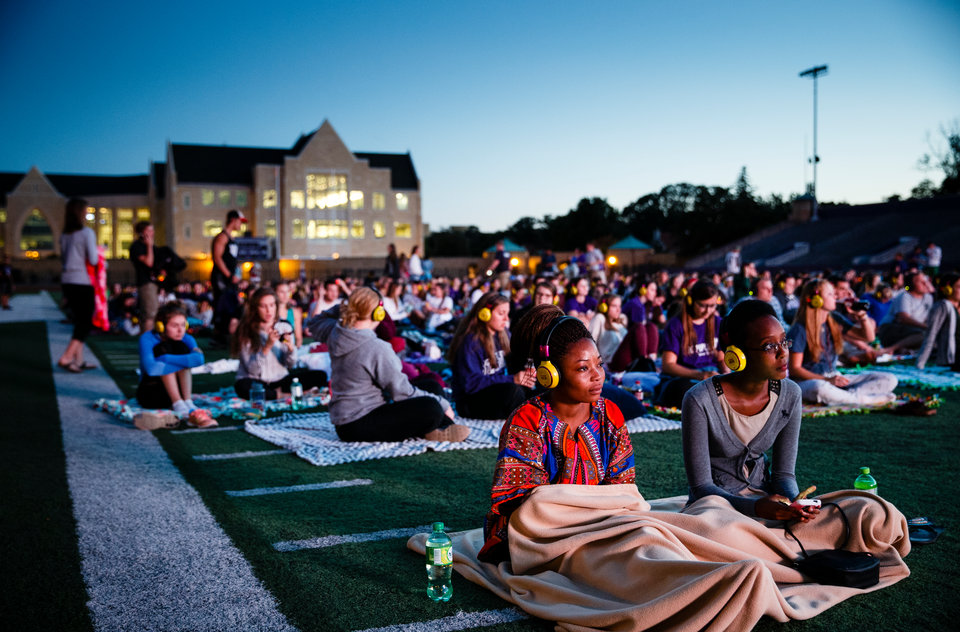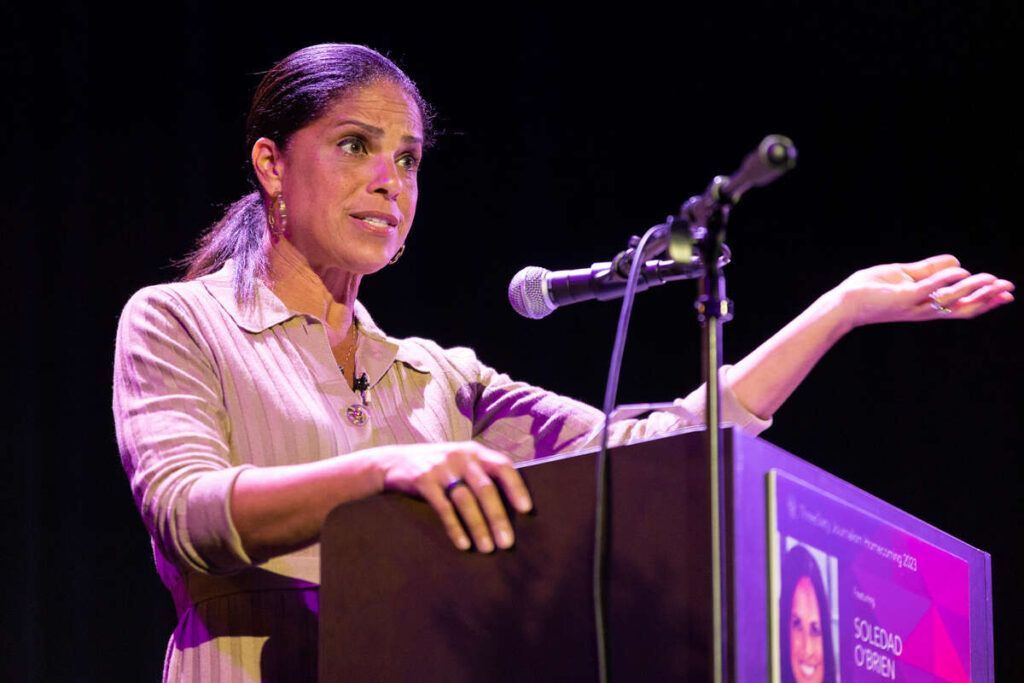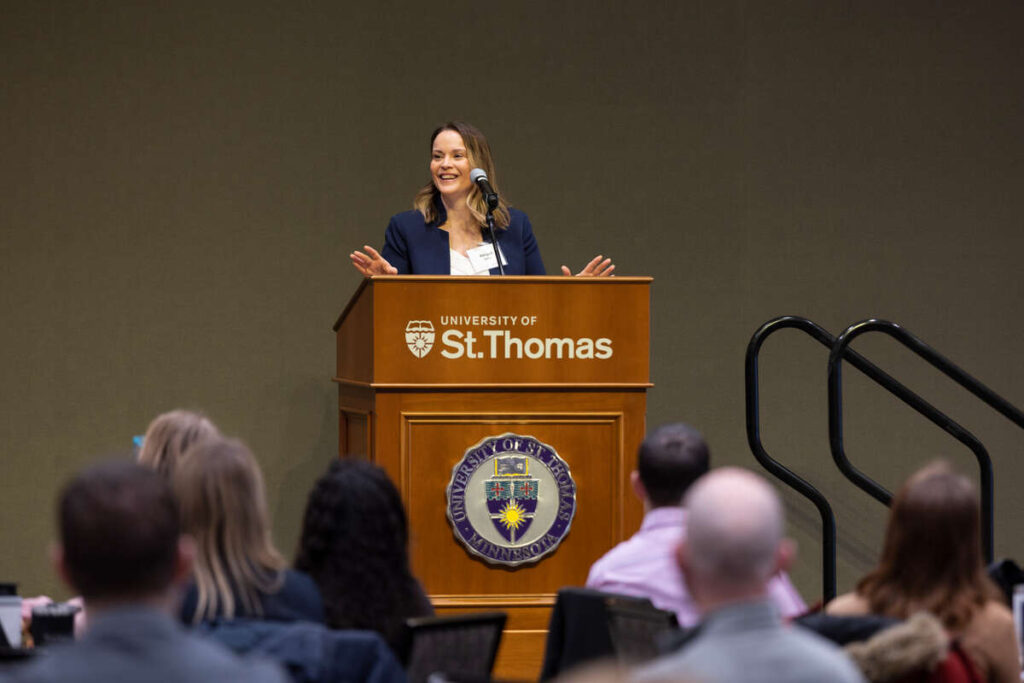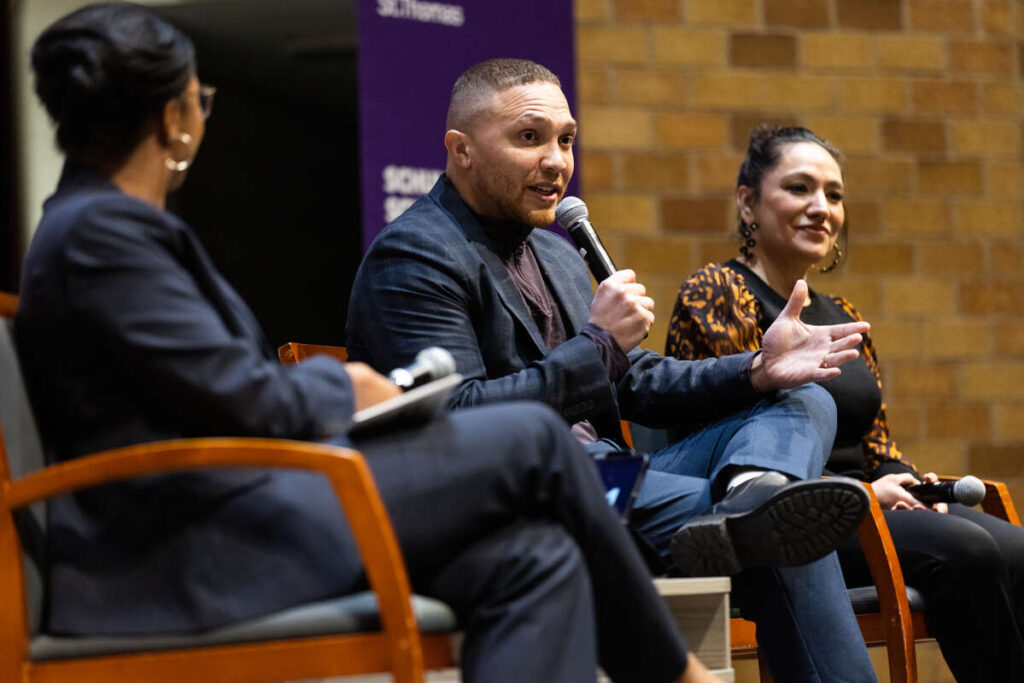Generation Z-ers aren’t coming to a workplace or college campus near you. They’re already there.
Generational expert and best-selling author David Stillman and his 16-year-old son, Jonah, were on the St. Paul campus on Tuesday presenting to St. Thomas students, faculty and staff about generations and the characteristics that define them, particularly the tens of millions of Generation Z-ers born from 1995-2012. Your quick mental math is right: The front of that generation is already 20, making their way through college and into the workplace.
Throughout their hour-long presentation, David (a Gen X-er) and Jonah sprinkled in anecdotes from their own lives to illustrate the differences in thinking between the up-and-coming generation and its predecessors. At one point they even turned to an instant smart phone poll so the audience could vote whether they sided with David or Jonah on an ongoing dispute centered on whether Skype was an acceptable substitute for attending a meeting in person. (While the results gave David a slight edge, he did have to concede that the person they were meeting with loved having Jonah there by Skype. The debate continues.)
With an entertaining style, alternating between playful ribbing and cooperative presenting, the Stillmans gave a wide-ranging breakdown on today’s generations and the up-and-coming influence of Generation Z. Here are five observations from their presentation.
Generations are a broad brush, but can be grouped by their collective experiences more than age.
Stillman pointed out that generational divides go a lot deeper than ages; they’re shaped in largest part by the events that characterized their formative years. People do tend to get more entrenched in their generational values as they get older, too, so those major things that happen early stick.
The Baby Boomers (1946-64), for example, were the largest generation in history and had to fight to stand out among the crowd, making them competitive. Their formative years were marked by struggles through Vietnam, an assassinated president and civil rights divides. As they fought back to fix the wrongs of the troubled world they grew up in, they became a very idealistic group.
Generation Z-ers also are shaped by their experiences: They have come of age in a post-9/11 world of security threats, economic recessions and political division. But they have also come of age knowing a black president and now a viable female presidential candidate; more diversity than ever in our nation’s history; and access to more information than ever before. Their views and attitudes are shaped by this landscape of their formative years.
Generation Z is not an extension of the Millennial generation.
As the largest generation by far since the Baby Boomers, the Millennial generation has tended to hog the spotlight. It would be a mistake to let that continue and neglect attention toward the generation behind it.
“They’re nothing like the Millennials. Some similarities, maybe. But they’re really forging their own path … We have a whole new generation showing up,” David said. “As you learn more about these differences, please don’t go to this place where you’re trying to figure out who’s right or wrong. Don’t judge Gen Z about who’s better or worse. The only thing to do is embrace how they’re different.”
Generation Z lives in a 'phigital' world.
For those born in the late '90s and 2000s, the lines between the physical and digital worlds have been erased. Technology has been such a ubiquitous part of life for them that it is not accepted that technology itself is a good thing; it’s all about what it does, whether it works and whether it’s effective.
At the same time, this younger group prefers face-to-face communication more than any other. When asked what type of communication Gen Z-ers preferred between email, phone, texting or face-to-face, 96 percent of the audience guessed texting. The Stillmans' nationwide research polls found 82 percent of Gen Z-ers prefer face-to-face communication above all else.
Generation Z is used to having things hyper-custom.
Jonah put it this way: “We Gen Z-ers have been building our personal brands our whole life.” It’s all about choice: Social media has allowed them to customize what they show the world; they consume their news by selecting specifically what sources to get it from; and their music choices are based not on whole albums, but specific songs.
With education, this attitude is reflected in the growing numbers of personalized majors. Professionally, this attitude is reflected by the desire for input and control of their different roles and career paths. The cookie-cutter approach of climbing the corporate ladder isn’t as appealing as the opportunity to change and shape their impact over time.
FOMO is a real thing, but you can DIY with just about anything.
If you didn’t know FOMO stood for Fear of Missing Out, you already might be trailing in your acronym vocabulary. Coming up in an age of constant access to information, it’s perhaps no surprise that Gen Z-ers tend to feel the need to be connected (See: constant refreshing of the Twitter feed.)
Professionally and academically, it’s important to understand that 75 percent of Generation Z-ers would be interested in multiple roles in one place of employment. Doing just one thing means there are other things out there you’re missing. The same idea holds in place for Z-ers desire for not just transparency from schools and employers, but frequency. (“The idea of quarterly updates,” Jonah said, “Won’t fly.”)
Doing it yourself comes a lot more naturally to someone who knows the solution to practically everything can be found online. There is nothing you can’t do. So it is that 17 percent of Gen Z-ers said they want to own their own business (up 11 percent from the Millennial generation), which can be traced to the 32 percent of Gen Z-ers who had a parent own their own business. The power of, “I got this,” is there.







